Reflective Practice: Health and Social Care Principles and Values
VerifiedAdded on 2021/01/02
|16
|4915
|476
Report
AI Summary
This report delves into the application of reflective practice within health and social care settings, focusing on the principles and values that underpin effective service delivery. It begins by defining the role and purpose of reflection, highlighting its importance in enhancing skills, knowledge, and professional conduct. The report then explores various models and tools used to facilitate reflection, with a specific emphasis on Gibbs' reflective cycle. It examines how different practice themes and quality assurance indicators are linked to learning and professional development. Furthermore, the report discusses methods for gathering evidence of effective reflective practice, including the creation of a practice-based portfolio. Finally, the report outlines career development targets and provides a comprehensive analysis of the gathered evidence, contributing to both personal and professional growth within the healthcare field.
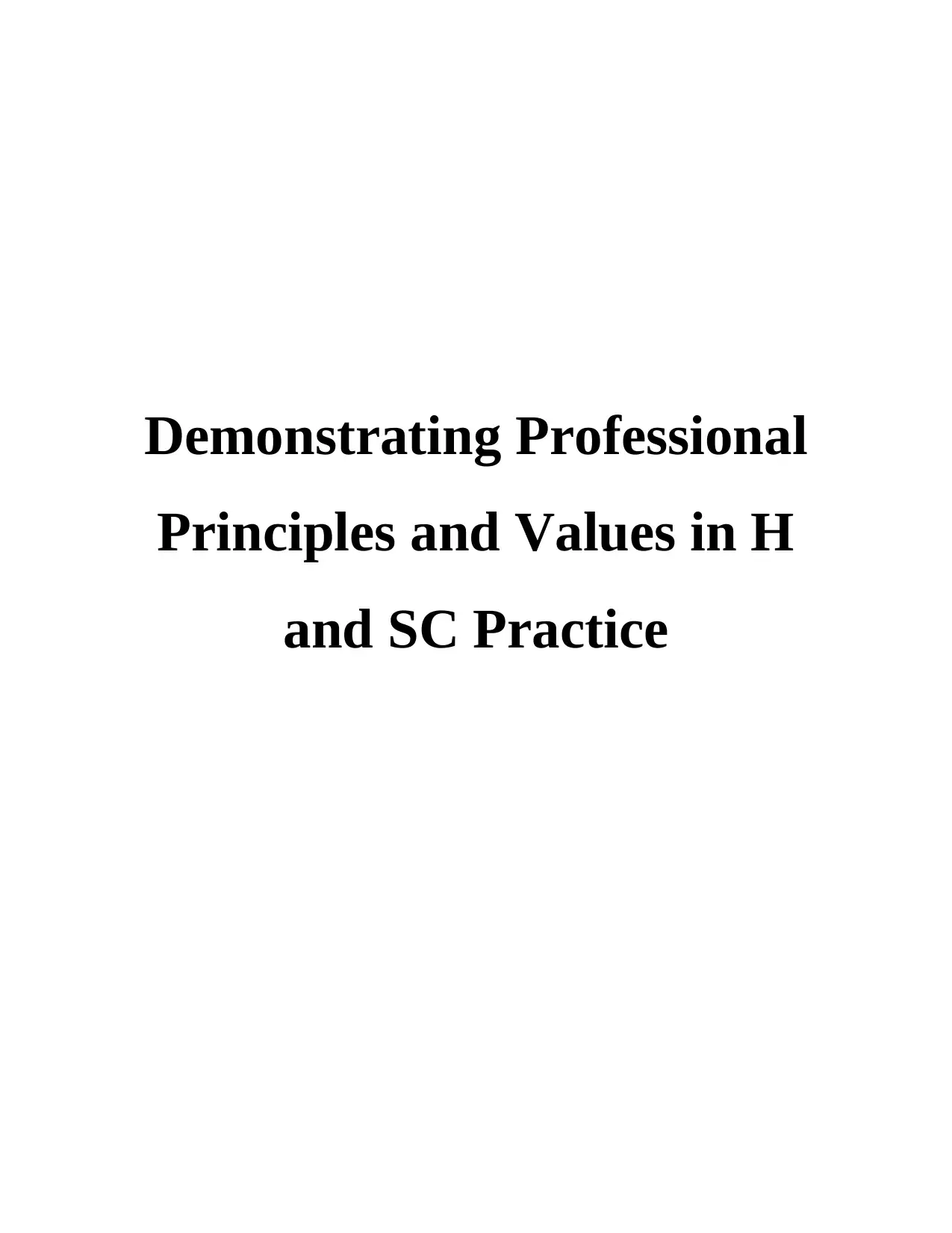
Demonstrating Professional
Principles and Values in H
and SC Practice
Principles and Values in H
and SC Practice
Paraphrase This Document
Need a fresh take? Get an instant paraphrase of this document with our AI Paraphraser
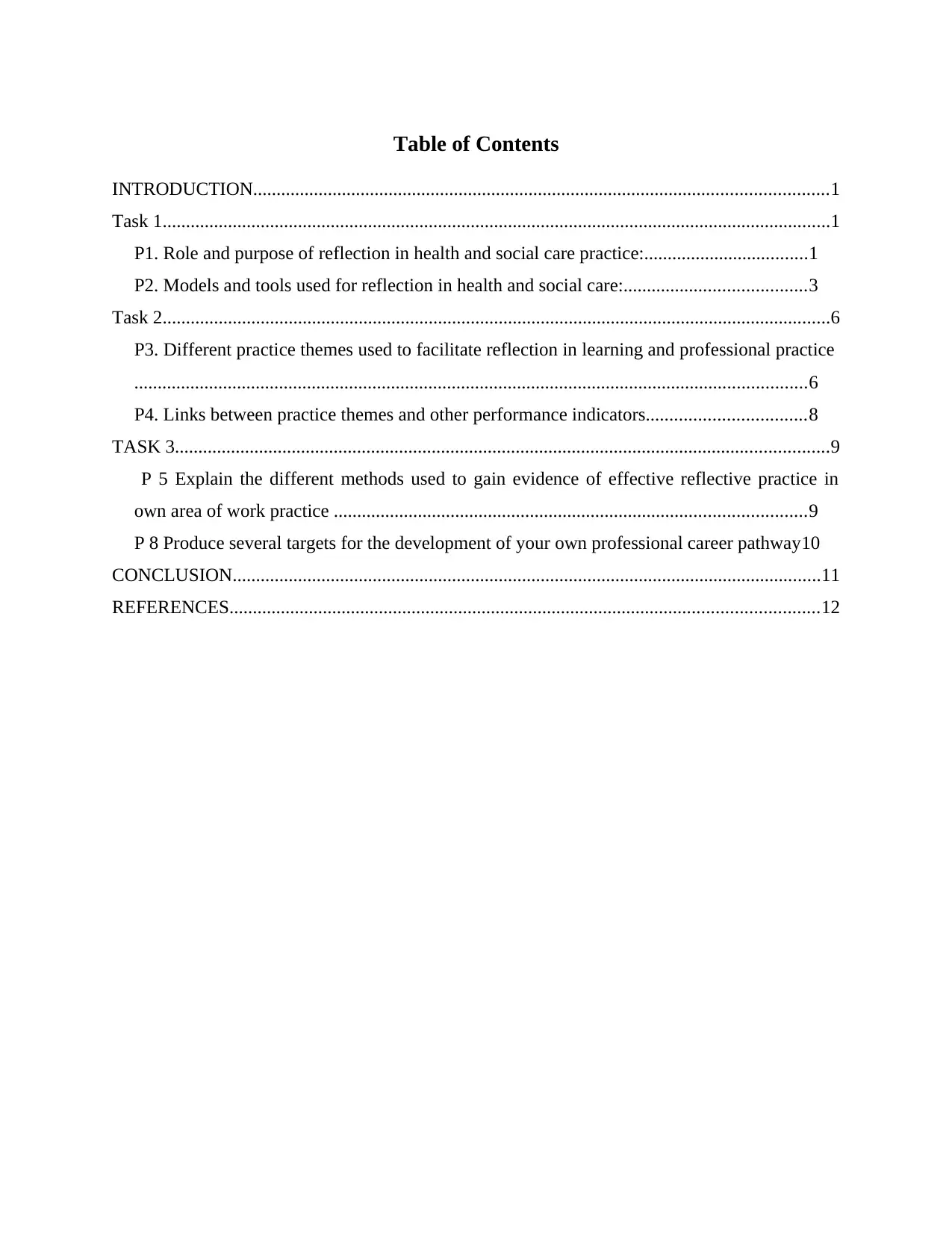
Table of Contents
INTRODUCTION...........................................................................................................................1
Task 1...............................................................................................................................................1
P1. Role and purpose of reflection in health and social care practice:...................................1
P2. Models and tools used for reflection in health and social care:.......................................3
Task 2...............................................................................................................................................6
P3. Different practice themes used to facilitate reflection in learning and professional practice
................................................................................................................................................6
P4. Links between practice themes and other performance indicators..................................8
TASK 3............................................................................................................................................9
P 5 Explain the different methods used to gain evidence of effective reflective practice in
own area of work practice .....................................................................................................9
P 8 Produce several targets for the development of your own professional career pathway10
CONCLUSION..............................................................................................................................11
REFERENCES..............................................................................................................................12
INTRODUCTION...........................................................................................................................1
Task 1...............................................................................................................................................1
P1. Role and purpose of reflection in health and social care practice:...................................1
P2. Models and tools used for reflection in health and social care:.......................................3
Task 2...............................................................................................................................................6
P3. Different practice themes used to facilitate reflection in learning and professional practice
................................................................................................................................................6
P4. Links between practice themes and other performance indicators..................................8
TASK 3............................................................................................................................................9
P 5 Explain the different methods used to gain evidence of effective reflective practice in
own area of work practice .....................................................................................................9
P 8 Produce several targets for the development of your own professional career pathway10
CONCLUSION..............................................................................................................................11
REFERENCES..............................................................................................................................12

⊘ This is a preview!⊘
Do you want full access?
Subscribe today to unlock all pages.

Trusted by 1+ million students worldwide
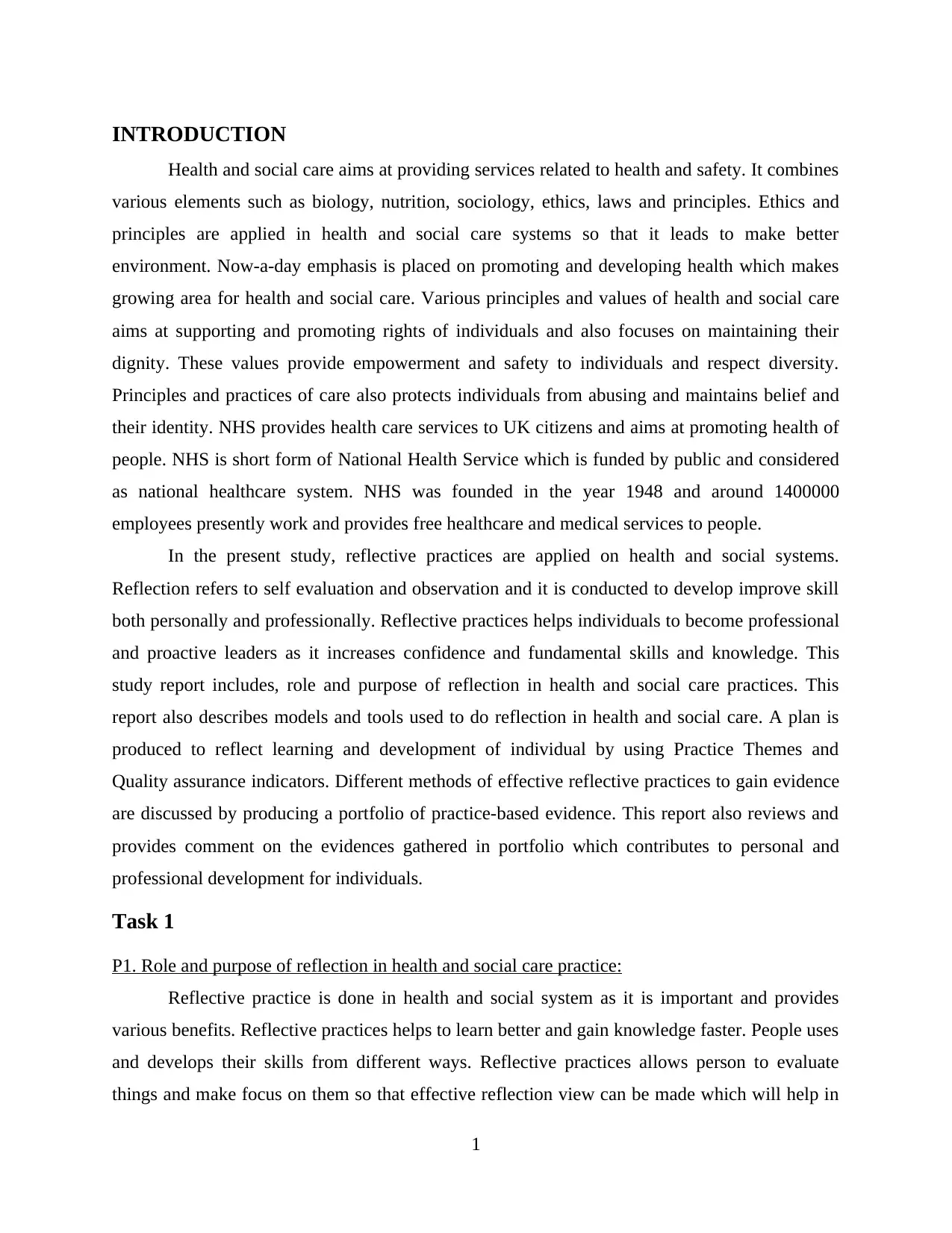
INTRODUCTION
Health and social care aims at providing services related to health and safety. It combines
various elements such as biology, nutrition, sociology, ethics, laws and principles. Ethics and
principles are applied in health and social care systems so that it leads to make better
environment. Now-a-day emphasis is placed on promoting and developing health which makes
growing area for health and social care. Various principles and values of health and social care
aims at supporting and promoting rights of individuals and also focuses on maintaining their
dignity. These values provide empowerment and safety to individuals and respect diversity.
Principles and practices of care also protects individuals from abusing and maintains belief and
their identity. NHS provides health care services to UK citizens and aims at promoting health of
people. NHS is short form of National Health Service which is funded by public and considered
as national healthcare system. NHS was founded in the year 1948 and around 1400000
employees presently work and provides free healthcare and medical services to people.
In the present study, reflective practices are applied on health and social systems.
Reflection refers to self evaluation and observation and it is conducted to develop improve skill
both personally and professionally. Reflective practices helps individuals to become professional
and proactive leaders as it increases confidence and fundamental skills and knowledge. This
study report includes, role and purpose of reflection in health and social care practices. This
report also describes models and tools used to do reflection in health and social care. A plan is
produced to reflect learning and development of individual by using Practice Themes and
Quality assurance indicators. Different methods of effective reflective practices to gain evidence
are discussed by producing a portfolio of practice-based evidence. This report also reviews and
provides comment on the evidences gathered in portfolio which contributes to personal and
professional development for individuals.
Task 1
P1. Role and purpose of reflection in health and social care practice:
Reflective practice is done in health and social system as it is important and provides
various benefits. Reflective practices helps to learn better and gain knowledge faster. People uses
and develops their skills from different ways. Reflective practices allows person to evaluate
things and make focus on them so that effective reflection view can be made which will help in
1
Health and social care aims at providing services related to health and safety. It combines
various elements such as biology, nutrition, sociology, ethics, laws and principles. Ethics and
principles are applied in health and social care systems so that it leads to make better
environment. Now-a-day emphasis is placed on promoting and developing health which makes
growing area for health and social care. Various principles and values of health and social care
aims at supporting and promoting rights of individuals and also focuses on maintaining their
dignity. These values provide empowerment and safety to individuals and respect diversity.
Principles and practices of care also protects individuals from abusing and maintains belief and
their identity. NHS provides health care services to UK citizens and aims at promoting health of
people. NHS is short form of National Health Service which is funded by public and considered
as national healthcare system. NHS was founded in the year 1948 and around 1400000
employees presently work and provides free healthcare and medical services to people.
In the present study, reflective practices are applied on health and social systems.
Reflection refers to self evaluation and observation and it is conducted to develop improve skill
both personally and professionally. Reflective practices helps individuals to become professional
and proactive leaders as it increases confidence and fundamental skills and knowledge. This
study report includes, role and purpose of reflection in health and social care practices. This
report also describes models and tools used to do reflection in health and social care. A plan is
produced to reflect learning and development of individual by using Practice Themes and
Quality assurance indicators. Different methods of effective reflective practices to gain evidence
are discussed by producing a portfolio of practice-based evidence. This report also reviews and
provides comment on the evidences gathered in portfolio which contributes to personal and
professional development for individuals.
Task 1
P1. Role and purpose of reflection in health and social care practice:
Reflective practice is done in health and social system as it is important and provides
various benefits. Reflective practices helps to learn better and gain knowledge faster. People uses
and develops their skills from different ways. Reflective practices allows person to evaluate
things and make focus on them so that effective reflection view can be made which will help in
1
Paraphrase This Document
Need a fresh take? Get an instant paraphrase of this document with our AI Paraphraser
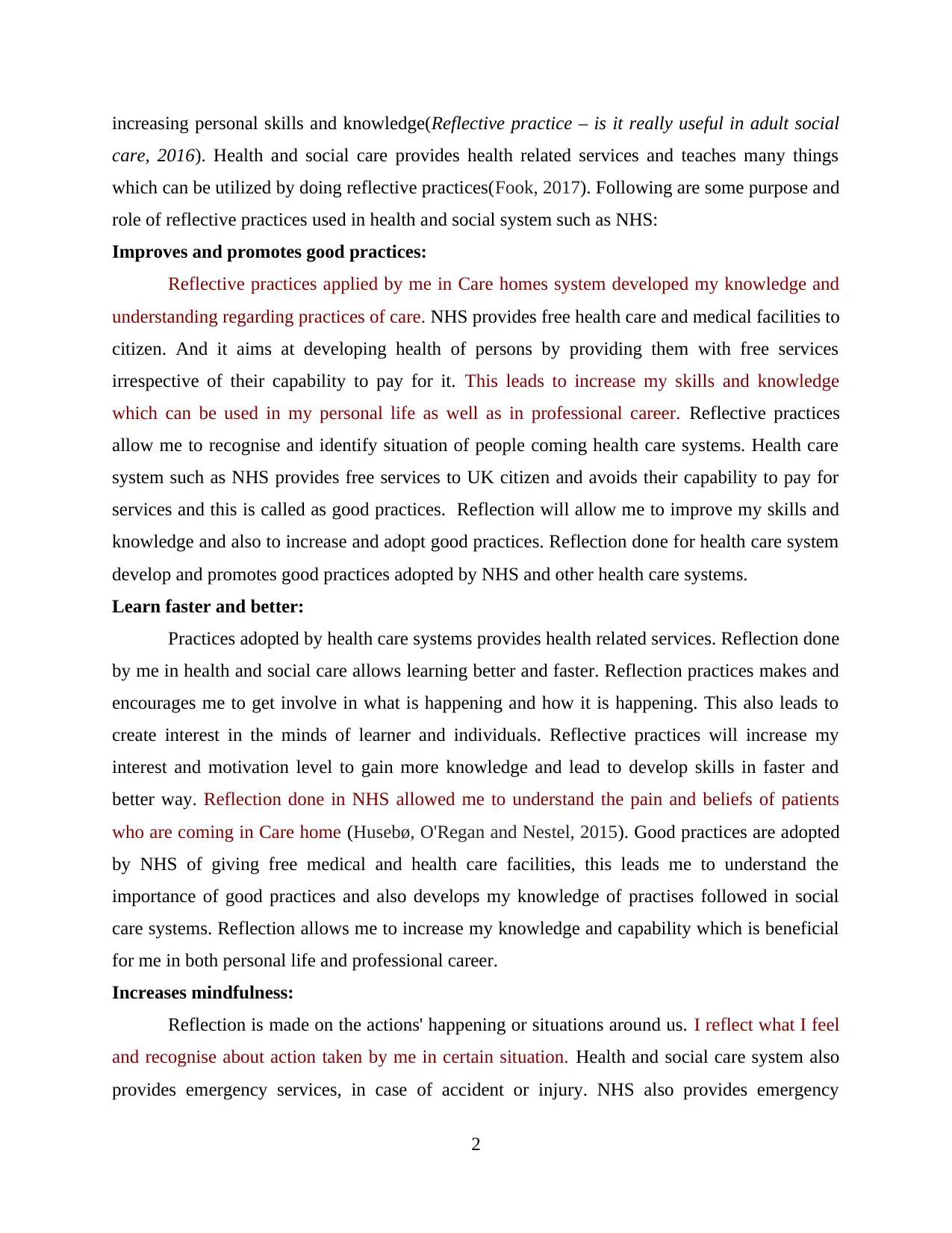
increasing personal skills and knowledge(Reflective practice – is it really useful in adult social
care, 2016). Health and social care provides health related services and teaches many things
which can be utilized by doing reflective practices(Fook, 2017). Following are some purpose and
role of reflective practices used in health and social system such as NHS:
Improves and promotes good practices:
Reflective practices applied by me in Care homes system developed my knowledge and
understanding regarding practices of care. NHS provides free health care and medical facilities to
citizen. And it aims at developing health of persons by providing them with free services
irrespective of their capability to pay for it. This leads to increase my skills and knowledge
which can be used in my personal life as well as in professional career. Reflective practices
allow me to recognise and identify situation of people coming health care systems. Health care
system such as NHS provides free services to UK citizen and avoids their capability to pay for
services and this is called as good practices. Reflection will allow me to improve my skills and
knowledge and also to increase and adopt good practices. Reflection done for health care system
develop and promotes good practices adopted by NHS and other health care systems.
Learn faster and better:
Practices adopted by health care systems provides health related services. Reflection done
by me in health and social care allows learning better and faster. Reflection practices makes and
encourages me to get involve in what is happening and how it is happening. This also leads to
create interest in the minds of learner and individuals. Reflective practices will increase my
interest and motivation level to gain more knowledge and lead to develop skills in faster and
better way. Reflection done in NHS allowed me to understand the pain and beliefs of patients
who are coming in Care home (Husebø, O'Regan and Nestel, 2015). Good practices are adopted
by NHS of giving free medical and health care facilities, this leads me to understand the
importance of good practices and also develops my knowledge of practises followed in social
care systems. Reflection allows me to increase my knowledge and capability which is beneficial
for me in both personal life and professional career.
Increases mindfulness:
Reflection is made on the actions' happening or situations around us. I reflect what I feel
and recognise about action taken by me in certain situation. Health and social care system also
provides emergency services, in case of accident or injury. NHS also provides emergency
2
care, 2016). Health and social care provides health related services and teaches many things
which can be utilized by doing reflective practices(Fook, 2017). Following are some purpose and
role of reflective practices used in health and social system such as NHS:
Improves and promotes good practices:
Reflective practices applied by me in Care homes system developed my knowledge and
understanding regarding practices of care. NHS provides free health care and medical facilities to
citizen. And it aims at developing health of persons by providing them with free services
irrespective of their capability to pay for it. This leads to increase my skills and knowledge
which can be used in my personal life as well as in professional career. Reflective practices
allow me to recognise and identify situation of people coming health care systems. Health care
system such as NHS provides free services to UK citizen and avoids their capability to pay for
services and this is called as good practices. Reflection will allow me to improve my skills and
knowledge and also to increase and adopt good practices. Reflection done for health care system
develop and promotes good practices adopted by NHS and other health care systems.
Learn faster and better:
Practices adopted by health care systems provides health related services. Reflection done
by me in health and social care allows learning better and faster. Reflection practices makes and
encourages me to get involve in what is happening and how it is happening. This also leads to
create interest in the minds of learner and individuals. Reflective practices will increase my
interest and motivation level to gain more knowledge and lead to develop skills in faster and
better way. Reflection done in NHS allowed me to understand the pain and beliefs of patients
who are coming in Care home (Husebø, O'Regan and Nestel, 2015). Good practices are adopted
by NHS of giving free medical and health care facilities, this leads me to understand the
importance of good practices and also develops my knowledge of practises followed in social
care systems. Reflection allows me to increase my knowledge and capability which is beneficial
for me in both personal life and professional career.
Increases mindfulness:
Reflection is made on the actions' happening or situations around us. I reflect what I feel
and recognise about action taken by me in certain situation. Health and social care system also
provides emergency services, in case of accident or injury. NHS also provides emergency
2
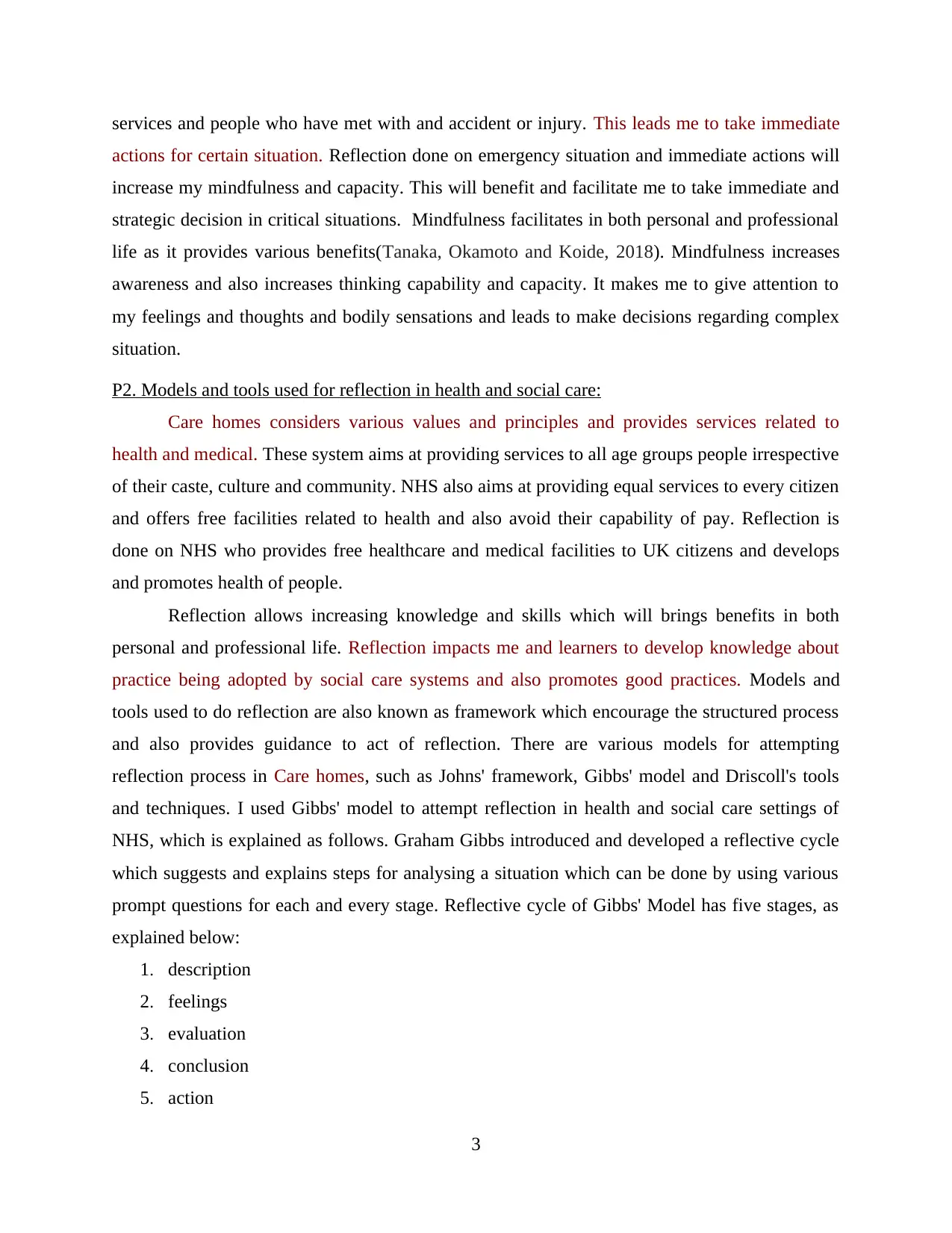
services and people who have met with and accident or injury. This leads me to take immediate
actions for certain situation. Reflection done on emergency situation and immediate actions will
increase my mindfulness and capacity. This will benefit and facilitate me to take immediate and
strategic decision in critical situations. Mindfulness facilitates in both personal and professional
life as it provides various benefits(Tanaka, Okamoto and Koide, 2018). Mindfulness increases
awareness and also increases thinking capability and capacity. It makes me to give attention to
my feelings and thoughts and bodily sensations and leads to make decisions regarding complex
situation.
P2. Models and tools used for reflection in health and social care:
Care homes considers various values and principles and provides services related to
health and medical. These system aims at providing services to all age groups people irrespective
of their caste, culture and community. NHS also aims at providing equal services to every citizen
and offers free facilities related to health and also avoid their capability of pay. Reflection is
done on NHS who provides free healthcare and medical facilities to UK citizens and develops
and promotes health of people.
Reflection allows increasing knowledge and skills which will brings benefits in both
personal and professional life. Reflection impacts me and learners to develop knowledge about
practice being adopted by social care systems and also promotes good practices. Models and
tools used to do reflection are also known as framework which encourage the structured process
and also provides guidance to act of reflection. There are various models for attempting
reflection process in Care homes, such as Johns' framework, Gibbs' model and Driscoll's tools
and techniques. I used Gibbs' model to attempt reflection in health and social care settings of
NHS, which is explained as follows. Graham Gibbs introduced and developed a reflective cycle
which suggests and explains steps for analysing a situation which can be done by using various
prompt questions for each and every stage. Reflective cycle of Gibbs' Model has five stages, as
explained below:
1. description
2. feelings
3. evaluation
4. conclusion
5. action
3
actions for certain situation. Reflection done on emergency situation and immediate actions will
increase my mindfulness and capacity. This will benefit and facilitate me to take immediate and
strategic decision in critical situations. Mindfulness facilitates in both personal and professional
life as it provides various benefits(Tanaka, Okamoto and Koide, 2018). Mindfulness increases
awareness and also increases thinking capability and capacity. It makes me to give attention to
my feelings and thoughts and bodily sensations and leads to make decisions regarding complex
situation.
P2. Models and tools used for reflection in health and social care:
Care homes considers various values and principles and provides services related to
health and medical. These system aims at providing services to all age groups people irrespective
of their caste, culture and community. NHS also aims at providing equal services to every citizen
and offers free facilities related to health and also avoid their capability of pay. Reflection is
done on NHS who provides free healthcare and medical facilities to UK citizens and develops
and promotes health of people.
Reflection allows increasing knowledge and skills which will brings benefits in both
personal and professional life. Reflection impacts me and learners to develop knowledge about
practice being adopted by social care systems and also promotes good practices. Models and
tools used to do reflection are also known as framework which encourage the structured process
and also provides guidance to act of reflection. There are various models for attempting
reflection process in Care homes, such as Johns' framework, Gibbs' model and Driscoll's tools
and techniques. I used Gibbs' model to attempt reflection in health and social care settings of
NHS, which is explained as follows. Graham Gibbs introduced and developed a reflective cycle
which suggests and explains steps for analysing a situation which can be done by using various
prompt questions for each and every stage. Reflective cycle of Gibbs' Model has five stages, as
explained below:
1. description
2. feelings
3. evaluation
4. conclusion
5. action
3
⊘ This is a preview!⊘
Do you want full access?
Subscribe today to unlock all pages.

Trusted by 1+ million students worldwide
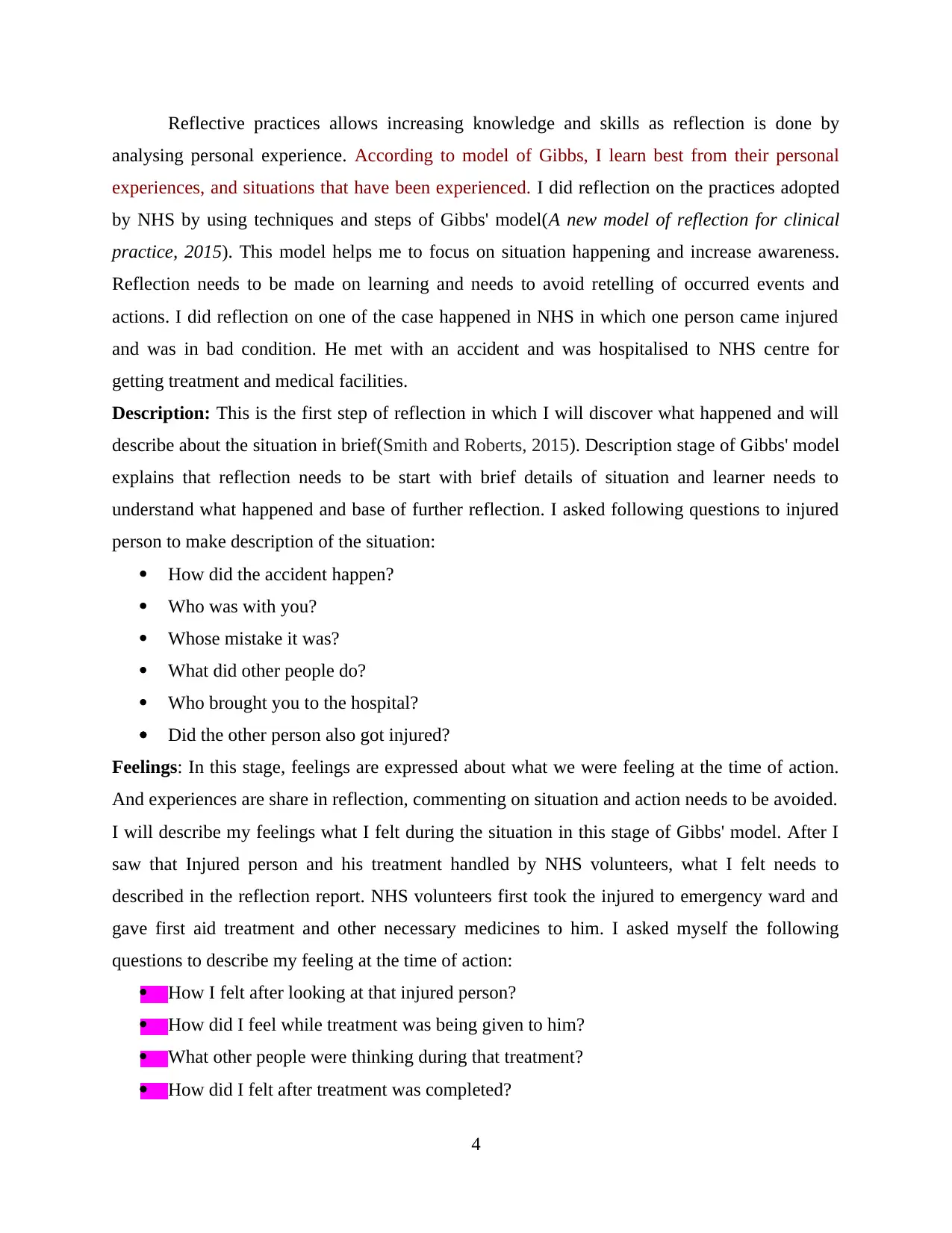
Reflective practices allows increasing knowledge and skills as reflection is done by
analysing personal experience. According to model of Gibbs, I learn best from their personal
experiences, and situations that have been experienced. I did reflection on the practices adopted
by NHS by using techniques and steps of Gibbs' model(A new model of reflection for clinical
practice, 2015). This model helps me to focus on situation happening and increase awareness.
Reflection needs to be made on learning and needs to avoid retelling of occurred events and
actions. I did reflection on one of the case happened in NHS in which one person came injured
and was in bad condition. He met with an accident and was hospitalised to NHS centre for
getting treatment and medical facilities.
Description: This is the first step of reflection in which I will discover what happened and will
describe about the situation in brief(Smith and Roberts, 2015). Description stage of Gibbs' model
explains that reflection needs to be start with brief details of situation and learner needs to
understand what happened and base of further reflection. I asked following questions to injured
person to make description of the situation:
How did the accident happen?
Who was with you?
Whose mistake it was?
What did other people do?
Who brought you to the hospital?
Did the other person also got injured?
Feelings: In this stage, feelings are expressed about what we were feeling at the time of action.
And experiences are share in reflection, commenting on situation and action needs to be avoided.
I will describe my feelings what I felt during the situation in this stage of Gibbs' model. After I
saw that Injured person and his treatment handled by NHS volunteers, what I felt needs to
described in the reflection report. NHS volunteers first took the injured to emergency ward and
gave first aid treatment and other necessary medicines to him. I asked myself the following
questions to describe my feeling at the time of action:
How I felt after looking at that injured person?
How did I feel while treatment was being given to him?
What other people were thinking during that treatment?
How did I felt after treatment was completed?
4
analysing personal experience. According to model of Gibbs, I learn best from their personal
experiences, and situations that have been experienced. I did reflection on the practices adopted
by NHS by using techniques and steps of Gibbs' model(A new model of reflection for clinical
practice, 2015). This model helps me to focus on situation happening and increase awareness.
Reflection needs to be made on learning and needs to avoid retelling of occurred events and
actions. I did reflection on one of the case happened in NHS in which one person came injured
and was in bad condition. He met with an accident and was hospitalised to NHS centre for
getting treatment and medical facilities.
Description: This is the first step of reflection in which I will discover what happened and will
describe about the situation in brief(Smith and Roberts, 2015). Description stage of Gibbs' model
explains that reflection needs to be start with brief details of situation and learner needs to
understand what happened and base of further reflection. I asked following questions to injured
person to make description of the situation:
How did the accident happen?
Who was with you?
Whose mistake it was?
What did other people do?
Who brought you to the hospital?
Did the other person also got injured?
Feelings: In this stage, feelings are expressed about what we were feeling at the time of action.
And experiences are share in reflection, commenting on situation and action needs to be avoided.
I will describe my feelings what I felt during the situation in this stage of Gibbs' model. After I
saw that Injured person and his treatment handled by NHS volunteers, what I felt needs to
described in the reflection report. NHS volunteers first took the injured to emergency ward and
gave first aid treatment and other necessary medicines to him. I asked myself the following
questions to describe my feeling at the time of action:
How I felt after looking at that injured person?
How did I feel while treatment was being given to him?
What other people were thinking during that treatment?
How did I felt after treatment was completed?
4
Paraphrase This Document
Need a fresh take? Get an instant paraphrase of this document with our AI Paraphraser
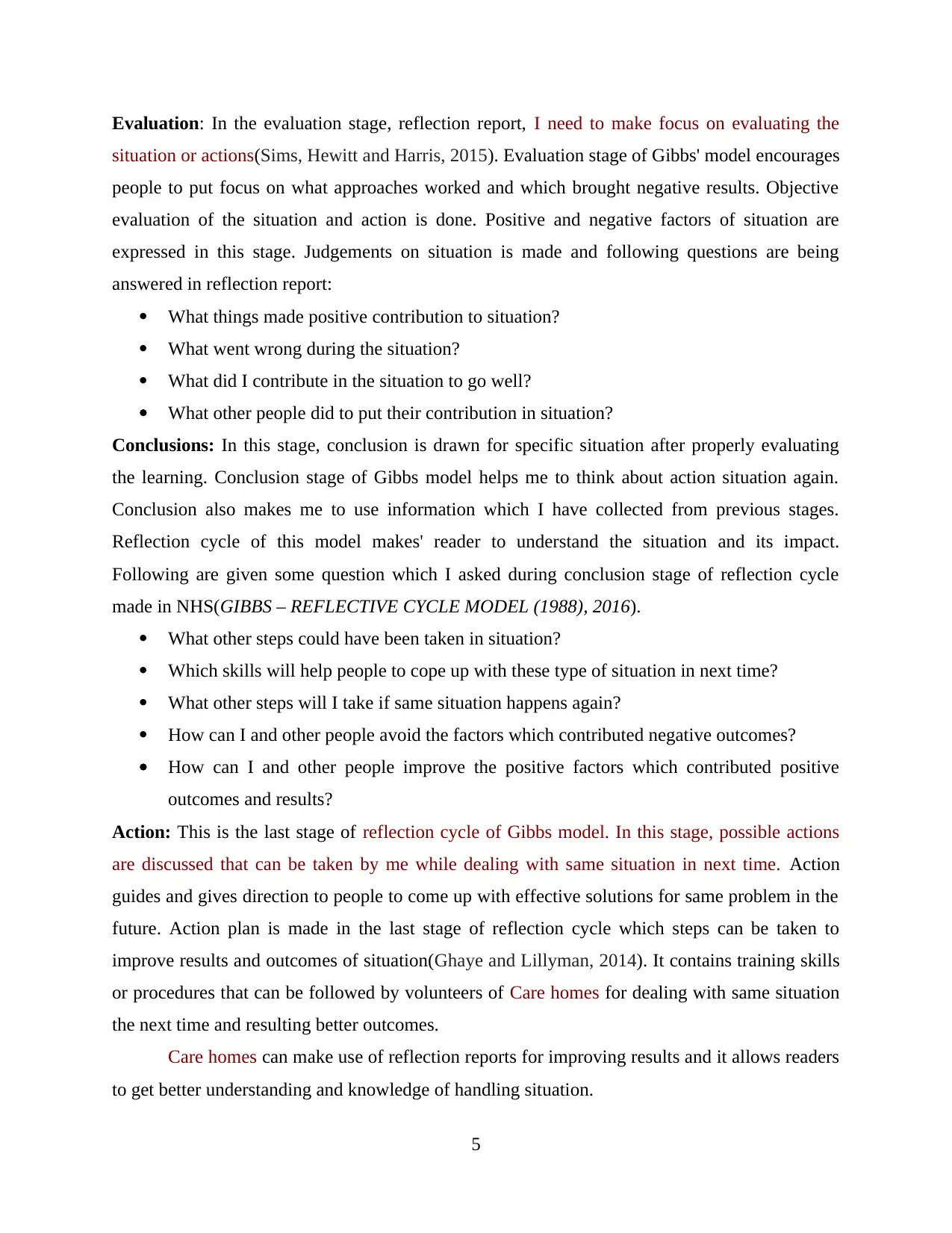
Evaluation: In the evaluation stage, reflection report, I need to make focus on evaluating the
situation or actions(Sims, Hewitt and Harris, 2015). Evaluation stage of Gibbs' model encourages
people to put focus on what approaches worked and which brought negative results. Objective
evaluation of the situation and action is done. Positive and negative factors of situation are
expressed in this stage. Judgements on situation is made and following questions are being
answered in reflection report:
What things made positive contribution to situation?
What went wrong during the situation?
What did I contribute in the situation to go well?
What other people did to put their contribution in situation?
Conclusions: In this stage, conclusion is drawn for specific situation after properly evaluating
the learning. Conclusion stage of Gibbs model helps me to think about action situation again.
Conclusion also makes me to use information which I have collected from previous stages.
Reflection cycle of this model makes' reader to understand the situation and its impact.
Following are given some question which I asked during conclusion stage of reflection cycle
made in NHS(GIBBS – REFLECTIVE CYCLE MODEL (1988), 2016).
What other steps could have been taken in situation?
Which skills will help people to cope up with these type of situation in next time?
What other steps will I take if same situation happens again?
How can I and other people avoid the factors which contributed negative outcomes?
How can I and other people improve the positive factors which contributed positive
outcomes and results?
Action: This is the last stage of reflection cycle of Gibbs model. In this stage, possible actions
are discussed that can be taken by me while dealing with same situation in next time. Action
guides and gives direction to people to come up with effective solutions for same problem in the
future. Action plan is made in the last stage of reflection cycle which steps can be taken to
improve results and outcomes of situation(Ghaye and Lillyman, 2014). It contains training skills
or procedures that can be followed by volunteers of Care homes for dealing with same situation
the next time and resulting better outcomes.
Care homes can make use of reflection reports for improving results and it allows readers
to get better understanding and knowledge of handling situation.
5
situation or actions(Sims, Hewitt and Harris, 2015). Evaluation stage of Gibbs' model encourages
people to put focus on what approaches worked and which brought negative results. Objective
evaluation of the situation and action is done. Positive and negative factors of situation are
expressed in this stage. Judgements on situation is made and following questions are being
answered in reflection report:
What things made positive contribution to situation?
What went wrong during the situation?
What did I contribute in the situation to go well?
What other people did to put their contribution in situation?
Conclusions: In this stage, conclusion is drawn for specific situation after properly evaluating
the learning. Conclusion stage of Gibbs model helps me to think about action situation again.
Conclusion also makes me to use information which I have collected from previous stages.
Reflection cycle of this model makes' reader to understand the situation and its impact.
Following are given some question which I asked during conclusion stage of reflection cycle
made in NHS(GIBBS – REFLECTIVE CYCLE MODEL (1988), 2016).
What other steps could have been taken in situation?
Which skills will help people to cope up with these type of situation in next time?
What other steps will I take if same situation happens again?
How can I and other people avoid the factors which contributed negative outcomes?
How can I and other people improve the positive factors which contributed positive
outcomes and results?
Action: This is the last stage of reflection cycle of Gibbs model. In this stage, possible actions
are discussed that can be taken by me while dealing with same situation in next time. Action
guides and gives direction to people to come up with effective solutions for same problem in the
future. Action plan is made in the last stage of reflection cycle which steps can be taken to
improve results and outcomes of situation(Ghaye and Lillyman, 2014). It contains training skills
or procedures that can be followed by volunteers of Care homes for dealing with same situation
the next time and resulting better outcomes.
Care homes can make use of reflection reports for improving results and it allows readers
to get better understanding and knowledge of handling situation.
5
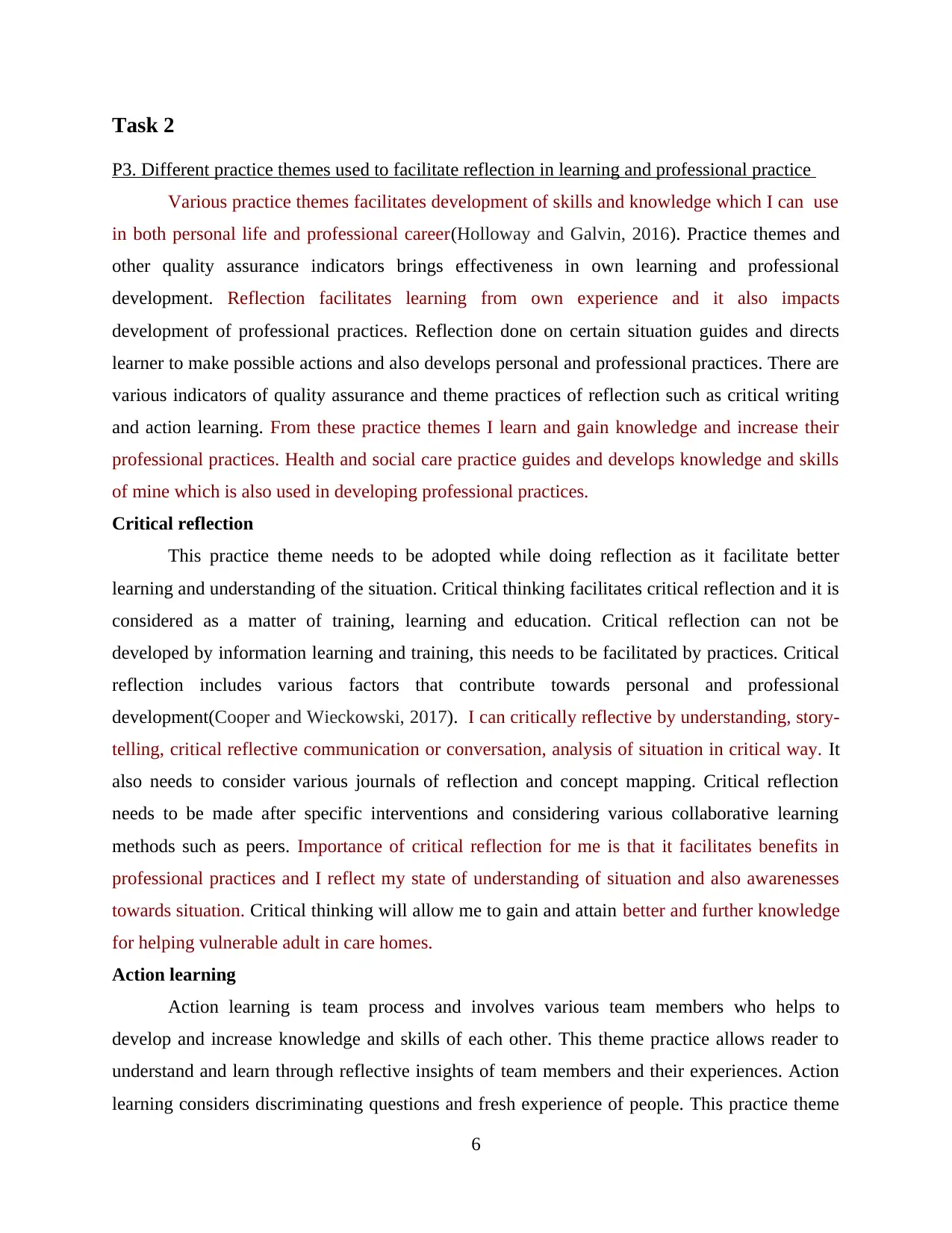
Task 2
P3. Different practice themes used to facilitate reflection in learning and professional practice
Various practice themes facilitates development of skills and knowledge which I can use
in both personal life and professional career(Holloway and Galvin, 2016). Practice themes and
other quality assurance indicators brings effectiveness in own learning and professional
development. Reflection facilitates learning from own experience and it also impacts
development of professional practices. Reflection done on certain situation guides and directs
learner to make possible actions and also develops personal and professional practices. There are
various indicators of quality assurance and theme practices of reflection such as critical writing
and action learning. From these practice themes I learn and gain knowledge and increase their
professional practices. Health and social care practice guides and develops knowledge and skills
of mine which is also used in developing professional practices.
Critical reflection
This practice theme needs to be adopted while doing reflection as it facilitate better
learning and understanding of the situation. Critical thinking facilitates critical reflection and it is
considered as a matter of training, learning and education. Critical reflection can not be
developed by information learning and training, this needs to be facilitated by practices. Critical
reflection includes various factors that contribute towards personal and professional
development(Cooper and Wieckowski, 2017). I can critically reflective by understanding, story-
telling, critical reflective communication or conversation, analysis of situation in critical way. It
also needs to consider various journals of reflection and concept mapping. Critical reflection
needs to be made after specific interventions and considering various collaborative learning
methods such as peers. Importance of critical reflection for me is that it facilitates benefits in
professional practices and I reflect my state of understanding of situation and also awarenesses
towards situation. Critical thinking will allow me to gain and attain better and further knowledge
for helping vulnerable adult in care homes.
Action learning
Action learning is team process and involves various team members who helps to
develop and increase knowledge and skills of each other. This theme practice allows reader to
understand and learn through reflective insights of team members and their experiences. Action
learning considers discriminating questions and fresh experience of people. This practice theme
6
P3. Different practice themes used to facilitate reflection in learning and professional practice
Various practice themes facilitates development of skills and knowledge which I can use
in both personal life and professional career(Holloway and Galvin, 2016). Practice themes and
other quality assurance indicators brings effectiveness in own learning and professional
development. Reflection facilitates learning from own experience and it also impacts
development of professional practices. Reflection done on certain situation guides and directs
learner to make possible actions and also develops personal and professional practices. There are
various indicators of quality assurance and theme practices of reflection such as critical writing
and action learning. From these practice themes I learn and gain knowledge and increase their
professional practices. Health and social care practice guides and develops knowledge and skills
of mine which is also used in developing professional practices.
Critical reflection
This practice theme needs to be adopted while doing reflection as it facilitate better
learning and understanding of the situation. Critical thinking facilitates critical reflection and it is
considered as a matter of training, learning and education. Critical reflection can not be
developed by information learning and training, this needs to be facilitated by practices. Critical
reflection includes various factors that contribute towards personal and professional
development(Cooper and Wieckowski, 2017). I can critically reflective by understanding, story-
telling, critical reflective communication or conversation, analysis of situation in critical way. It
also needs to consider various journals of reflection and concept mapping. Critical reflection
needs to be made after specific interventions and considering various collaborative learning
methods such as peers. Importance of critical reflection for me is that it facilitates benefits in
professional practices and I reflect my state of understanding of situation and also awarenesses
towards situation. Critical thinking will allow me to gain and attain better and further knowledge
for helping vulnerable adult in care homes.
Action learning
Action learning is team process and involves various team members who helps to
develop and increase knowledge and skills of each other. This theme practice allows reader to
understand and learn through reflective insights of team members and their experiences. Action
learning considers discriminating questions and fresh experience of people. This practice theme
6
⊘ This is a preview!⊘
Do you want full access?
Subscribe today to unlock all pages.

Trusted by 1+ million students worldwide
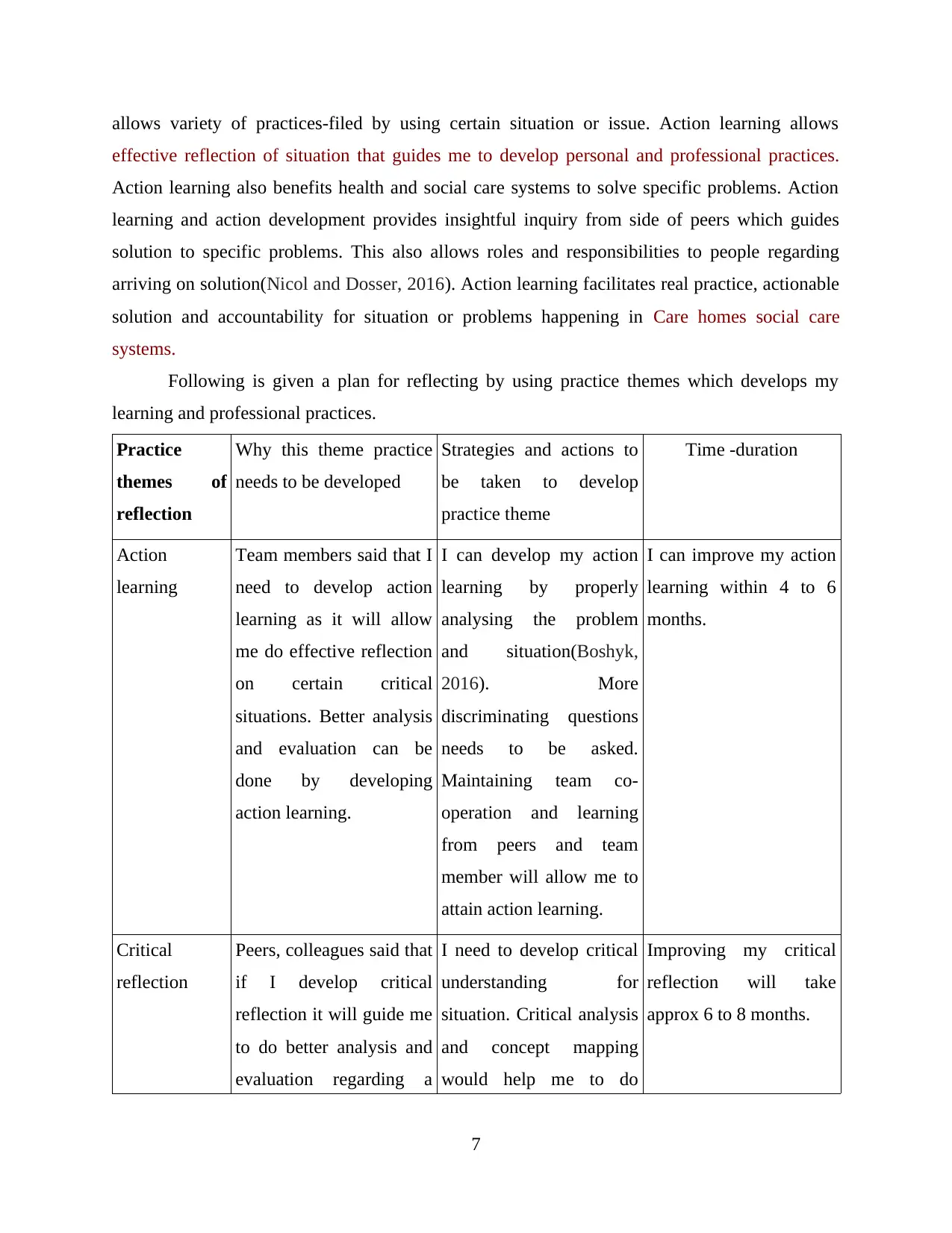
allows variety of practices-filed by using certain situation or issue. Action learning allows
effective reflection of situation that guides me to develop personal and professional practices.
Action learning also benefits health and social care systems to solve specific problems. Action
learning and action development provides insightful inquiry from side of peers which guides
solution to specific problems. This also allows roles and responsibilities to people regarding
arriving on solution(Nicol and Dosser, 2016). Action learning facilitates real practice, actionable
solution and accountability for situation or problems happening in Care homes social care
systems.
Following is given a plan for reflecting by using practice themes which develops my
learning and professional practices.
Practice
themes of
reflection
Why this theme practice
needs to be developed
Strategies and actions to
be taken to develop
practice theme
Time -duration
Action
learning
Team members said that I
need to develop action
learning as it will allow
me do effective reflection
on certain critical
situations. Better analysis
and evaluation can be
done by developing
action learning.
I can develop my action
learning by properly
analysing the problem
and situation(Boshyk,
2016). More
discriminating questions
needs to be asked.
Maintaining team co-
operation and learning
from peers and team
member will allow me to
attain action learning.
I can improve my action
learning within 4 to 6
months.
Critical
reflection
Peers, colleagues said that
if I develop critical
reflection it will guide me
to do better analysis and
evaluation regarding a
I need to develop critical
understanding for
situation. Critical analysis
and concept mapping
would help me to do
Improving my critical
reflection will take
approx 6 to 8 months.
7
effective reflection of situation that guides me to develop personal and professional practices.
Action learning also benefits health and social care systems to solve specific problems. Action
learning and action development provides insightful inquiry from side of peers which guides
solution to specific problems. This also allows roles and responsibilities to people regarding
arriving on solution(Nicol and Dosser, 2016). Action learning facilitates real practice, actionable
solution and accountability for situation or problems happening in Care homes social care
systems.
Following is given a plan for reflecting by using practice themes which develops my
learning and professional practices.
Practice
themes of
reflection
Why this theme practice
needs to be developed
Strategies and actions to
be taken to develop
practice theme
Time -duration
Action
learning
Team members said that I
need to develop action
learning as it will allow
me do effective reflection
on certain critical
situations. Better analysis
and evaluation can be
done by developing
action learning.
I can develop my action
learning by properly
analysing the problem
and situation(Boshyk,
2016). More
discriminating questions
needs to be asked.
Maintaining team co-
operation and learning
from peers and team
member will allow me to
attain action learning.
I can improve my action
learning within 4 to 6
months.
Critical
reflection
Peers, colleagues said that
if I develop critical
reflection it will guide me
to do better analysis and
evaluation regarding a
I need to develop critical
understanding for
situation. Critical analysis
and concept mapping
would help me to do
Improving my critical
reflection will take
approx 6 to 8 months.
7
Paraphrase This Document
Need a fresh take? Get an instant paraphrase of this document with our AI Paraphraser
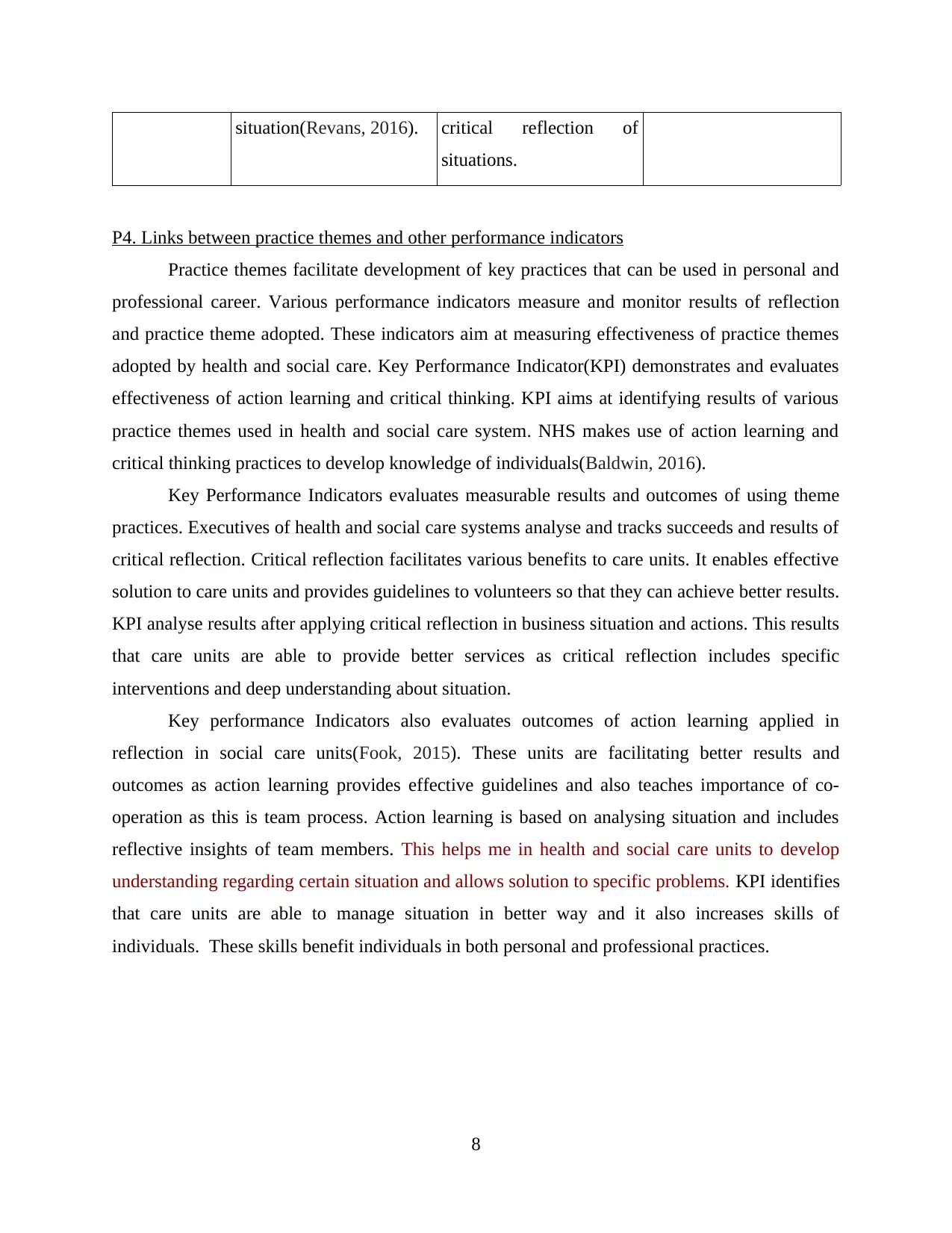
situation(Revans, 2016). critical reflection of
situations.
P4. Links between practice themes and other performance indicators
Practice themes facilitate development of key practices that can be used in personal and
professional career. Various performance indicators measure and monitor results of reflection
and practice theme adopted. These indicators aim at measuring effectiveness of practice themes
adopted by health and social care. Key Performance Indicator(KPI) demonstrates and evaluates
effectiveness of action learning and critical thinking. KPI aims at identifying results of various
practice themes used in health and social care system. NHS makes use of action learning and
critical thinking practices to develop knowledge of individuals(Baldwin, 2016).
Key Performance Indicators evaluates measurable results and outcomes of using theme
practices. Executives of health and social care systems analyse and tracks succeeds and results of
critical reflection. Critical reflection facilitates various benefits to care units. It enables effective
solution to care units and provides guidelines to volunteers so that they can achieve better results.
KPI analyse results after applying critical reflection in business situation and actions. This results
that care units are able to provide better services as critical reflection includes specific
interventions and deep understanding about situation.
Key performance Indicators also evaluates outcomes of action learning applied in
reflection in social care units(Fook, 2015). These units are facilitating better results and
outcomes as action learning provides effective guidelines and also teaches importance of co-
operation as this is team process. Action learning is based on analysing situation and includes
reflective insights of team members. This helps me in health and social care units to develop
understanding regarding certain situation and allows solution to specific problems. KPI identifies
that care units are able to manage situation in better way and it also increases skills of
individuals. These skills benefit individuals in both personal and professional practices.
8
situations.
P4. Links between practice themes and other performance indicators
Practice themes facilitate development of key practices that can be used in personal and
professional career. Various performance indicators measure and monitor results of reflection
and practice theme adopted. These indicators aim at measuring effectiveness of practice themes
adopted by health and social care. Key Performance Indicator(KPI) demonstrates and evaluates
effectiveness of action learning and critical thinking. KPI aims at identifying results of various
practice themes used in health and social care system. NHS makes use of action learning and
critical thinking practices to develop knowledge of individuals(Baldwin, 2016).
Key Performance Indicators evaluates measurable results and outcomes of using theme
practices. Executives of health and social care systems analyse and tracks succeeds and results of
critical reflection. Critical reflection facilitates various benefits to care units. It enables effective
solution to care units and provides guidelines to volunteers so that they can achieve better results.
KPI analyse results after applying critical reflection in business situation and actions. This results
that care units are able to provide better services as critical reflection includes specific
interventions and deep understanding about situation.
Key performance Indicators also evaluates outcomes of action learning applied in
reflection in social care units(Fook, 2015). These units are facilitating better results and
outcomes as action learning provides effective guidelines and also teaches importance of co-
operation as this is team process. Action learning is based on analysing situation and includes
reflective insights of team members. This helps me in health and social care units to develop
understanding regarding certain situation and allows solution to specific problems. KPI identifies
that care units are able to manage situation in better way and it also increases skills of
individuals. These skills benefit individuals in both personal and professional practices.
8
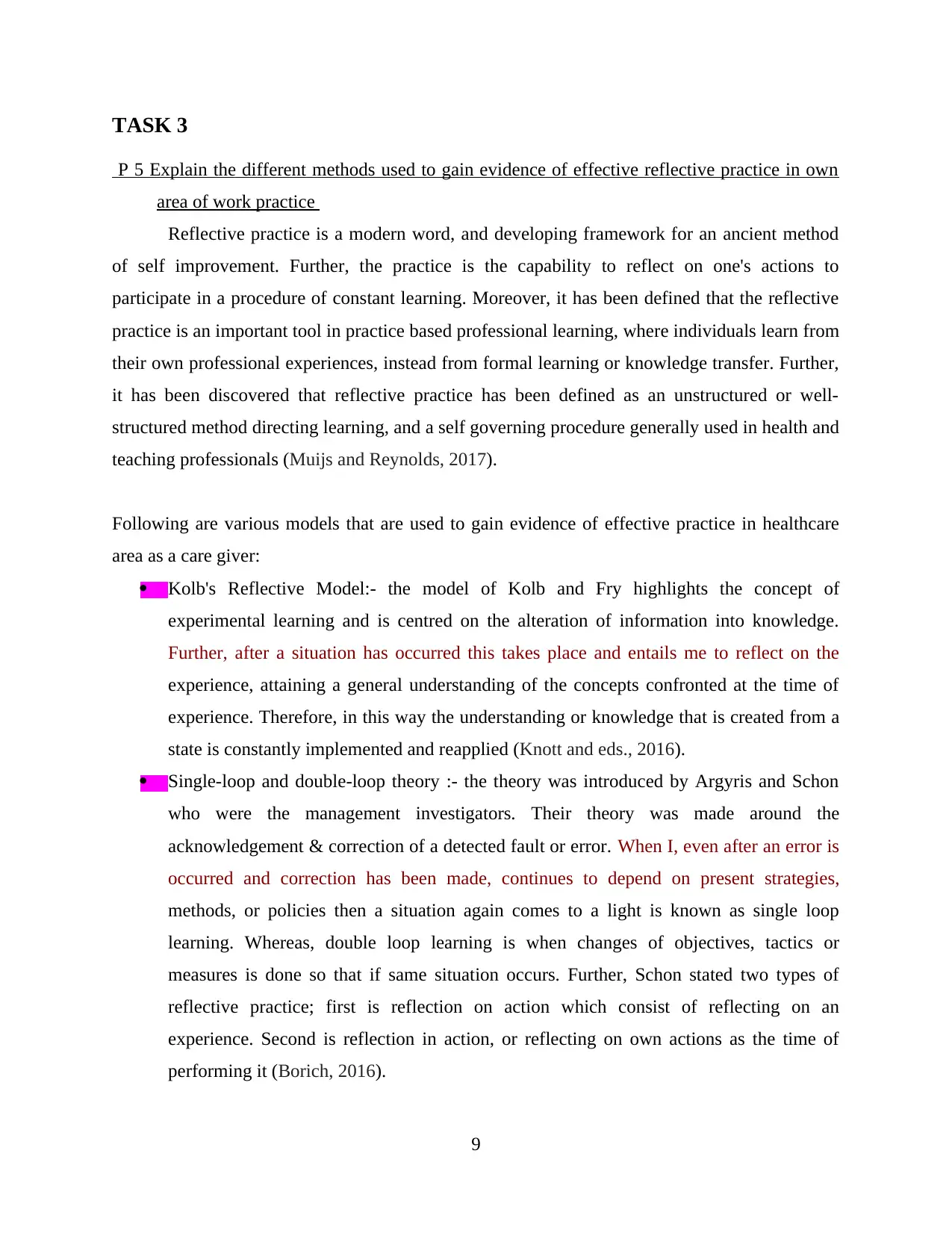
TASK 3
P 5 Explain the different methods used to gain evidence of effective reflective practice in own
area of work practice
Reflective practice is a modern word, and developing framework for an ancient method
of self improvement. Further, the practice is the capability to reflect on one's actions to
participate in a procedure of constant learning. Moreover, it has been defined that the reflective
practice is an important tool in practice based professional learning, where individuals learn from
their own professional experiences, instead from formal learning or knowledge transfer. Further,
it has been discovered that reflective practice has been defined as an unstructured or well-
structured method directing learning, and a self governing procedure generally used in health and
teaching professionals (Muijs and Reynolds, 2017).
Following are various models that are used to gain evidence of effective practice in healthcare
area as a care giver:
Kolb's Reflective Model:- the model of Kolb and Fry highlights the concept of
experimental learning and is centred on the alteration of information into knowledge.
Further, after a situation has occurred this takes place and entails me to reflect on the
experience, attaining a general understanding of the concepts confronted at the time of
experience. Therefore, in this way the understanding or knowledge that is created from a
state is constantly implemented and reapplied (Knott and eds., 2016).
Single-loop and double-loop theory :- the theory was introduced by Argyris and Schon
who were the management investigators. Their theory was made around the
acknowledgement & correction of a detected fault or error. When I, even after an error is
occurred and correction has been made, continues to depend on present strategies,
methods, or policies then a situation again comes to a light is known as single loop
learning. Whereas, double loop learning is when changes of objectives, tactics or
measures is done so that if same situation occurs. Further, Schon stated two types of
reflective practice; first is reflection on action which consist of reflecting on an
experience. Second is reflection in action, or reflecting on own actions as the time of
performing it (Borich, 2016).
9
P 5 Explain the different methods used to gain evidence of effective reflective practice in own
area of work practice
Reflective practice is a modern word, and developing framework for an ancient method
of self improvement. Further, the practice is the capability to reflect on one's actions to
participate in a procedure of constant learning. Moreover, it has been defined that the reflective
practice is an important tool in practice based professional learning, where individuals learn from
their own professional experiences, instead from formal learning or knowledge transfer. Further,
it has been discovered that reflective practice has been defined as an unstructured or well-
structured method directing learning, and a self governing procedure generally used in health and
teaching professionals (Muijs and Reynolds, 2017).
Following are various models that are used to gain evidence of effective practice in healthcare
area as a care giver:
Kolb's Reflective Model:- the model of Kolb and Fry highlights the concept of
experimental learning and is centred on the alteration of information into knowledge.
Further, after a situation has occurred this takes place and entails me to reflect on the
experience, attaining a general understanding of the concepts confronted at the time of
experience. Therefore, in this way the understanding or knowledge that is created from a
state is constantly implemented and reapplied (Knott and eds., 2016).
Single-loop and double-loop theory :- the theory was introduced by Argyris and Schon
who were the management investigators. Their theory was made around the
acknowledgement & correction of a detected fault or error. When I, even after an error is
occurred and correction has been made, continues to depend on present strategies,
methods, or policies then a situation again comes to a light is known as single loop
learning. Whereas, double loop learning is when changes of objectives, tactics or
measures is done so that if same situation occurs. Further, Schon stated two types of
reflective practice; first is reflection on action which consist of reflecting on an
experience. Second is reflection in action, or reflecting on own actions as the time of
performing it (Borich, 2016).
9
⊘ This is a preview!⊘
Do you want full access?
Subscribe today to unlock all pages.

Trusted by 1+ million students worldwide
1 out of 16
Related Documents
Your All-in-One AI-Powered Toolkit for Academic Success.
+13062052269
info@desklib.com
Available 24*7 on WhatsApp / Email
![[object Object]](/_next/static/media/star-bottom.7253800d.svg)
Unlock your academic potential
Copyright © 2020–2026 A2Z Services. All Rights Reserved. Developed and managed by ZUCOL.



